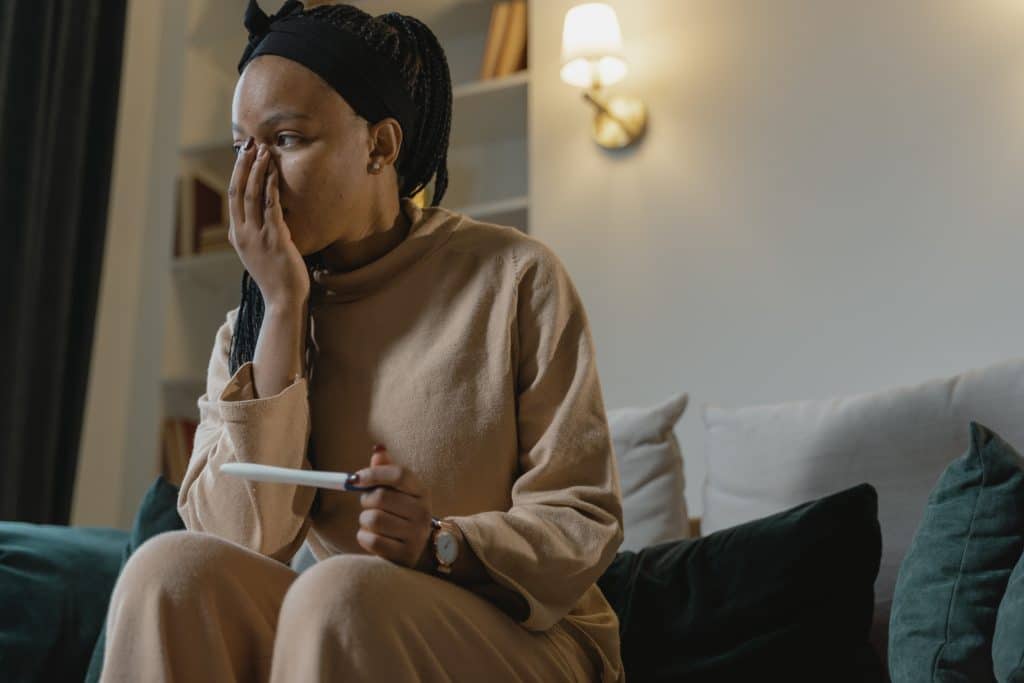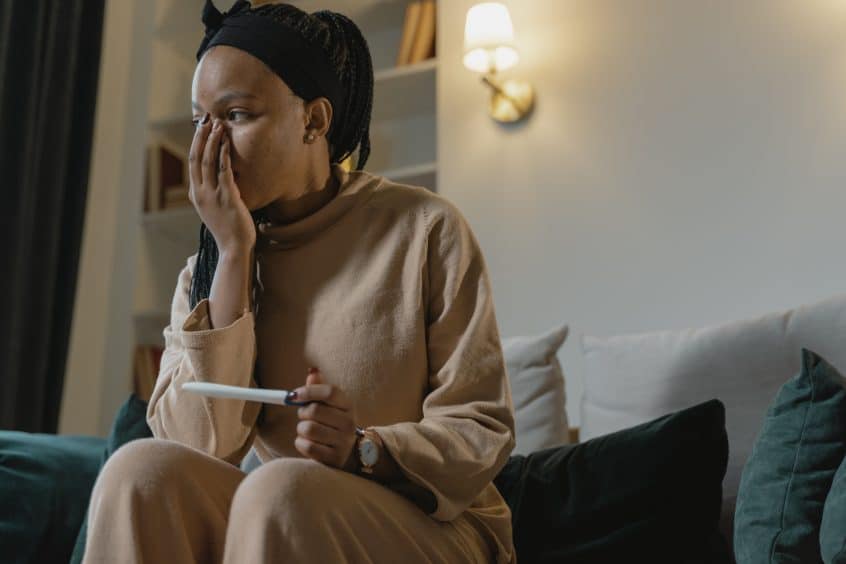Feeling anxious is understandable
Trying to have a baby and the early days of pregnancy can be nerve wracking for most parents. If you’ve experienced a previous loss at any stage during pregnancy, trying to conceive and early pregnancy are times when you can feel even more anxious.
You might constantly feel tense or on edge as you wait to see if your period will arrive or for the day when you can finally take a pregnancy test. You may worry that you won’t be able to get pregnant again.
Worrying about experiencing another loss and how you would cope might make a positive pregnancy test feel scary. You may be filled with feelings of terror or dread if you experience spotting (or you fear that you may have spotting each time you go to the toilet). And you may worry about every little twinge that you feel.
Feelings of sadness and grief may come up which can feel confusing if you have been longing to conceive again. You may feel guilty or worry that something is wrong with you if you are struggling to feel happy. And this can add to your anxiety.
You may also be feeling more worry that your anxiety is affecting your ability to get pregnant or your baby if you are already pregnant.
For some parents, any anxious feelings ease after they’ve reached a certain stage of pregnancy. Other parents may continue to experience these feelings until their baby has been born and they know that they are healthy.
Having regular scans may be reassuring for some parents. While other parents may find that scans make them feel more stressed and anxious.
It’s important to acknowledge that all of these feelings and reactions (and many others) are common and understandable. And we need to recognise that every parent’s experience will be unique to them. There are no rules about how you will feel in these circumstances or when these feelings will pass.

How to support yourself at this time:
While you may not be able to get rid of your anxiety completely, there are things that you can do to support yourself at this time.
1. Talk to someone who is supportive and understanding
You may need to think carefully about who this will be. Ideally, they would be someone who is able to hear and acknowledge how you are feeling without trying to “fix” you or make you feel better. Make sure they can listen and give you the space to feel whatever emotions are coming up. Some parents find it helpful to reach out to organisations that specialise in providing support after a perinatal loss. For example,The Miscarriage Association (https://www.miscarriageassociation.org.uk/), Sands (https://www.sands.org.uk/), The Ectopic Pregnancy Trust (https://ectopic.org.uk/) or Antenatal Results and Choices (https://www.arc-uk.org/) all provide support to parents who have experienced loss during pregnancy.
2. Do something nice for yourself
When you’re trying to get pregnant or at the start of your pregnancy, this can feel all consuming. And the nearly constant focus on pregnancy can fuel your anxiety and cause you to stay on edge. Doing something that you enjoy can help you to relax. This could be something as simple as going for a walk, watching a favourite film or meeting a friend for a coffee. And remember that doing something nice for yourself doesn’t have to cost anything.
3. Build your anxiety toolkit
Your anxiety toolkit might be an actual or mental list of activities that you know help you to manage your anxiety or feel more relaxed. You may also consider filling a bag or box with items (such as a stress ball or a favourite photo) or reminders for activities (for example, breathing exercises or yoga) that help you feel calm. It can be comforting to know that you have a range of support techniques available at any time to help you if it all feels like it’s too much.
4. Focus on the present moment
When you’re genuinely focused on the present moment, you are not able to think about what happened in the past or worry about what will happen in the future. And this can greatly help with your anxiety as ruminating on the past which can’t be changed and obsessing over a future that we can’t control are often our greatest sources of worry. Try to find an activity that requires your full attention in the present moment. For some people that might be meditation and others might feel that they’re most present when they are focused on an activity. This could be doing something as simple as taking notice of your surroundings as you walk along the street or noticing the suds and temperature of the water when you wash the dishes or take a shower.
5. Get moving
Any type of movement or exercise can help with anxiety. Although it is important to be aware that it can feel difficult to get moving when you’re feeling on edge. And it may cause you to feel emotional. Be gentle with yourself and find a form of movement that works for you. This might be something like going for a walk or run, doing a yoga or fitness class or turning on your favourite song and dancing around the living room.
Continuing to exercise can also be really beneficial during your pregnancy. But, if you are worried about exercising while you are pregnant, speak to your midwife or doctor. More information about exercising during pregnancy is available on the NHS website at: https://www.nhs.uk/pregnancy/keeping-well/exercise/
When to look for additional support
If you feel like your anxiety is getting worse or affecting your ability to go about your daily activities, you may want to think about looking for more support. You may also want to consider additional support if you are feeling that you need constant reassurance (that isn’t really giving you any peace of mind).
You can speak to your GP or another health professional. You might also be considering looking for private support from a therapist, transformational coach or counsellor. It is important to find someone who you are comfortable with. It may also be worth checking that they have an awareness of supporting parents after a loss.
Resources aimed at supporting your wellbeing and helping you to manage anxiety are available on the You HAVE Got This website (https://youhavegotthis.co.uk), Facebook (https://www.facebook.com/you.have.got.this.co.uk) and Instagram (https://www.instagram.com/amanda.at.you.have.got.this/).

